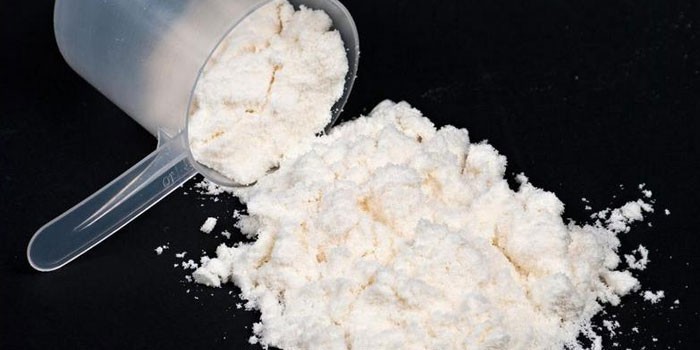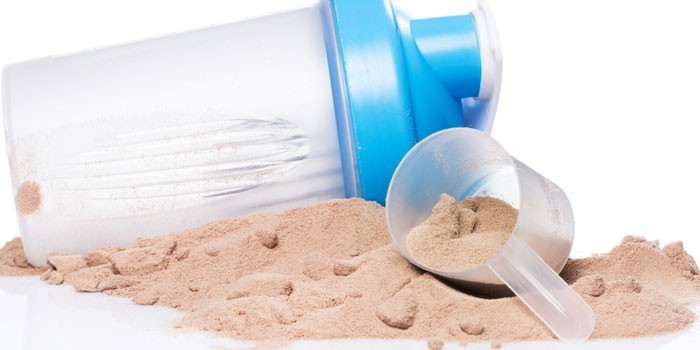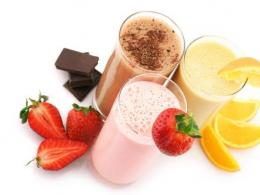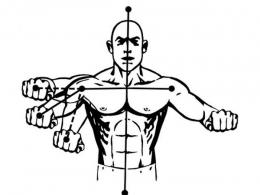What is protein and why does the body need it. The benefits and harms of protein shakes, how to take for weight loss
Protein is a key participant in important physiological processes, without which the functioning of organs and systems cannot be carried out. Protein supplements are more popular among athletes because they help improve performance and quickly gain muscle mass.
What are proteins
These substances serve as the most important building blocks of the human body. Proteins are found in every organ and cell, in addition, they serve as irreplaceable sources of energy. If the body does not receive enough protein, the liver converts proteins into fats, thereby forming a reserve of a quickly available source of energy. The assimilation of a substance begins immediately after it enters the stomach with food and lasts a long time when compared with the process of digesting carbohydrates. Therefore, when consuming protein foods, a person feels full for several hours.
What are proteins made of? The composition of this substance includes amino acids that are transported by blood to every cell of tissues and organs. Proteins play an important role in the life and growth of the body, they are able to normalize the water and acid-base balance. Without amino acids, it is impossible to create enzymes, hormones, and this is only a small part of the functions of these substances. The chemical formula of a protein molecule is as follows: H2N–CH(R)–COOH.
What is protein for?
Protein, polypeptides and protein - the name of one element, which consists of a chain of amino acids. The component serves as the basis of tissues and the main building substance of the body. What is protein and what is it for? Regular intake of protein in the human body guarantees nitrogen balance and increases the rate of muscle building. Proteins are substances that contain a large number of amino acids. They may be plant or animal in nature.
Why drink protein? With regular consumption of a product containing a lot of proteins, athletes increase muscle volume and maintain the energy charge necessary for a full workout. At the same time, the right amount of protein for a person involved in bodybuilding depends on the degree of intensity of sports. Daily you can consume up to 2-3 grams of protein per 1 kg of body weight. In order for amino acids to be absorbed normally, carbohydrates must also be present in the diet.
What does protein help bodybuilders achieve? If you regularly use the substance in parallel with sports activities:
- an increase in muscle mass will begin;
- fat deposits will burn quickly (this is due to the fact that the protein suppresses hunger well, in addition, the rate of fat breakdown depends on the volume of muscles: the more there are, the easier it is for a person to lose weight);
- health will improve (proteins ensure the renewal of every cell in the body);
- the athlete's body will become more prominent (this is due to the growth of muscle mass and help in losing weight).
Protein shakes for muscle growth
This product belongs to the group of sports nutrition products and is a rich source of protein, while the protein powder does not increase the daily calorie content of the diet. A protein shake is useful for everyone who is seriously involved in sports, trying to improve their body faster. At the same time, the choice of a product should be based on the intensity of training, their frequency and individual parameters of a person (weight, height, etc.).
You can drink cocktails before or after playing sports for half an hour. It is desirable that the temperature of the drink be about 37 degrees - this will improve the absorption of nutrients. Taking a protein shake at night can only be beneficial if you drink a certain type of product that takes a long time to digest. To achieve the expected effect, the powder must be diluted in 250-300 ml of liquid, then the protein will be fully absorbed by the body.
Protein for weight gain
To increase body weight, it is important to eat a lot of protein foods, but not everyone is able to eat the right amount of food to make up for the lack of protein in the body (especially athletes). Especially for this purpose, protein supplements containing a high proportion of protein have been created. You can buy protein powder at any sports nutrition store. However, it should be understood that proteins for weight gain are only an addition to the usual diet, and not a replacement for protein foods (cottage cheese, other dairy products, meat, beans, etc.).
It is most effective to use amino acids in combination with sports, good rest and a balanced diet. A person who decides to drink a protein shake to gain weight, but who does not go in for sports, should provide himself with at least minimal physical activity (jogging a couple of times a week, daily exercises, developing a specific muscle group). Otherwise, the resulting protein will be excessive, so it will not be absorbed by the body, and fats and carbohydrates in the composition of the product will settle as an extra load on the body in the form of deposits.
Why do girls need protein
Women involved in fitness often use sports nutrition, including protein shakes. Protein for girls is amino acids that are responsible not only for muscle development, but also help:
- improve the functioning of the gastrointestinal tract;
- restore hormonal levels;
- deliver trace elements and nutrients to body tissues;
- improve the protective functions of a person.
There is no difference in the effect of amino acids on the female and male bodies: for a person who regularly intensively engages in bodybuilding, the daily intake of the substance should be approximately 1-2 grams per kilogram of body weight. Proteins that enter the body in the form of supplements perform the same functions in men and women, so the protein powder is not divided into female and male (with rare exceptions, in which sports nutrition may contain sex hormones, but this must be indicated on the packaging).

Protein for weight loss
In addition to weight gain, a nutritional supplement can perform the exact opposite function and be used for weight loss. This can be achieved by choosing the right diet, type and intensity of sports training. The consequence of regular exercise and low-calorie nutrition will be getting rid of excess deposits in the body. However, since the body begins to burn not only fat but also muscle in a calorie deficit, it is important to consume enough protein during weight loss to prevent loss of muscle tissue.
Girls and men need protein for weight loss not only to maintain existing muscles, but also to build new muscle tissue. Amino acids help the body to lose weight properly, using only those accumulations that have a fatty structure. At the same time, it is important to actively engage in sports, otherwise the consumed proteins will be deposited in the body with new folds. When consuming protein for weight loss, you need to follow this rule: there should be a minimum of harmful carbohydrates in the menu, and you need to consume calories by 15% less than you spend per day.
Types of proteins in sports nutrition
There are a lot of varieties of the product and additives are divided according to the type of raw material and the degree of purification. The second factor plays a much smaller role than the first one. The types of protein and the purpose of the product are closely related, since each type of supplement differs in efficiency and action. To choose the right protein for a particular task, it is worth analyzing the characteristics of each type of protein.
Whey Protein
The name of the product indicates that it is made from whey. A distinctive feature of this supplement is fast digestibility (the process takes a minimum of time compared to other types of protein), so it is better to use soluble whey protein immediately before or after training. The product contains meat protein and is therefore not suitable for vegetarians. According to the degree of purification, it is divided into:
- whey protein hydrolyzate;
- whey protein isolate;
- whey protein concentrate.
Casein protein
This type of food supplement has a higher price than others, but has a more useful (rich) composition of amino acids. However, casein protein is absorbed by the body longer, so you should drink a cocktail in advance before training or even at night. In adults, casein protein can cause allergies, so protein should be used with caution. The product is prepared by curdling milk, at home it can be replaced with natural sour curd (it is less fat). According to the degree of purification, the product is divided into:
- calcium caseinate;
- micellar casein.

soy protein
The substance is obtained from soy, so the product has a relatively low cost. However, plant proteins, including soy protein, do not have a complete amino acid profile and are unable to stimulate protein synthesis in the same way that other types of food do. If you increase the dosage of the additive and supplement the product with lecithin, the effect will be much better. The advantage of soy and hemp proteins is that they swell a lot when mixed, which is very appropriate during weight loss (the drink gives a feeling of satiety).
Which protein is best
According to many athletes, whey protein is the best: the product is well absorbed by the body, saturating the body with useful substances to quickly restore such an energy source as ATP. In addition, the supplement stimulates anabolism, thereby accelerating muscle growth. However, the main disadvantage of whey protein is its relatively high cost.
It is impossible to say that the best protein is the one that is obtained from whey, since one or another type of sports nutrition may be more useful for each athlete, depending on the goals, systematicity and intensity of the athlete’s training. Consider the pros and cons of each type of protein:
- casein protein. The advantages of the supplement include the presence of all essential amino acids in the protein and its constancy, with which the body assimilates the product for a long time. So, having taken a portion of protein at night, you can not worry about the destruction of muscle tissue - casein will provide the muscles with the necessary components for their recovery. The downside of the supplement is poor digestibility: when it enters the stomach, the protein curdles, turning into a solid lump and slowing down the digestion process not only of its own, but of all other types of protein. It is worth using casein for those who want to lose weight, as it gives a long-lasting feeling of satiety.
- Whey Protein. The product is divided into three types according to the degree of purification, among which whey protein isolate stands out favorably. Its advantages are pleasant taste, excellent quality and good digestibility. The supplement contains neither lactose nor fat, while the protein has all the necessary amino acids for the development and increase in muscle volume. The downside of the supplement is the relatively high cost and high probability of purchasing a low-quality product, since some manufacturers mix other types of protein into it.
- Soy protein. It is considered the least effective protein for athletes because it contains an incomplete set of amino acids. In addition, soy protein tends to transform into estrogen, which is undesirable for male athletes. The advantage of the supplement is its benefits for the body: protein strengthens the immune system, normalizes cholesterol levels and reduces the risk of developing cancer.
- egg protein. The advantages of the product are excellent digestibility and a rich, perfectly balanced amino acid composition. The disadvantages of the additive include the high price and unpleasant taste.
- Fish protein. The disadvantage of the supplement is that the amino acids needed by the athlete's body in its composition are poorly absorbed, so the product is practically useless for a bodybuilder.
- Rice, pea protein, etc. Cereal proteins are not very effective for athletes who want to gain muscle mass because they have a low biological value. In addition, plant amino acids are slowly broken down and absorbed. Some supplements contain inhibitors that slow down digestion. The advantage of the product is its low price.
- Meat protein. The supplement contains virtually no cholesterol and fat and is made from beef protein. The advantage of the product is the presence of creatine in its composition, which additionally stimulates muscle growth and strength. In addition, meat protein is highly digestible and has a rich amino acid profile. The disadvantages of this type of sports nutrition include high cost.

How to take protein
For muscle growth, it is optimal for a person to consume 1.5-2 grams of protein per kilogram of body weight. It is better to drink protein twice a day, since it is difficult for the body to absorb a large amount of protein at one time. In this case, it is better to use a cocktail in the intervals between meals: on training days - between breakfast and lunch, and after immediately after class. On ordinary days, you can drink the primary intake of a protein drink instead of a daily snack, and the second time before dinner.
How to make a protein shake
To make a smoothie, you can simply mix the powder with water, juice, or milk. Optionally, you can make a multi-component drink using recipes from the network. The main thing is that protein shakes should not be hot, otherwise some of the beneficial properties will be lost. Regardless of whether you are trying to lose weight or gain muscle mass, making cocktails is no different. However, in the first case, you need to replace 1-2 meals a day with a protein drink, in the latter case, supplement your usual diet with amino acids. Cooking method:
- measure the right amount of protein with a measuring spoon;
- add some vanilla;
- mix the powder with lemonade or milk (200 ml);
- shake the mixture in a shaker.
The benefits and harms of protein
Protein is an indispensable assistant in the process of building muscle tissue, which needs additional building material during intense exercise. Like any product, the supplement has advantages and disadvantages. Benefits of protein besides helping to increase muscle volume:
- suppresses the feeling of hunger, helping to reduce the daily calorie content of the diet and thereby contributing to weight loss;
- lowers blood sugar levels;
- can serve as a hearty and healthy snack at work or on a trip;
- with its help, you can make up for the lack of proteins in the diet, which is especially important for vegetarians;
- includes a complex of amino acids necessary for the body;
- quickly absorbed, without leaving a feeling of heaviness;
- helps to increase energy charge, strength, endurance;
- normalizes insulin levels.
In addition to the positive aspects, the protein supplement has several disadvantages. What can be the harm of protein:
- powder can cause eating disorders (this applies to people who are lactose intolerant);
- when using an excessive dose of the supplement, the kidneys or liver may suffer;
- chemical sweeteners, flavors and other substances added by manufacturers to the product negatively affect the body.

side effects of protein
Read the label carefully before buying a sports supplement: the manufacturer, as a rule, indicates the side effects of the protein. Problems from drinking casein/whey powder can occur in people who have bowel problems or lactose intolerance. In addition, with the abuse of amino acids, the kidneys are subjected to excessive stress. To avoid the development of pathological conditions, it is necessary to control the amount of protein entering the body. Obesity can be another negative effect of excessive protein intake.
Protein Contraindications
Knowing what a protein is and that a lack of protein leads to various dysfunctions of the internal organs and systems of a person, it should be understood, however, that protein is contraindicated for some. People with:
- kidney disease, renal failure;
- genetic predisposition to diseases of the kidneys, liver;
- allergy to protein components;
- lactose intolerance (when using whey / casein protein).






